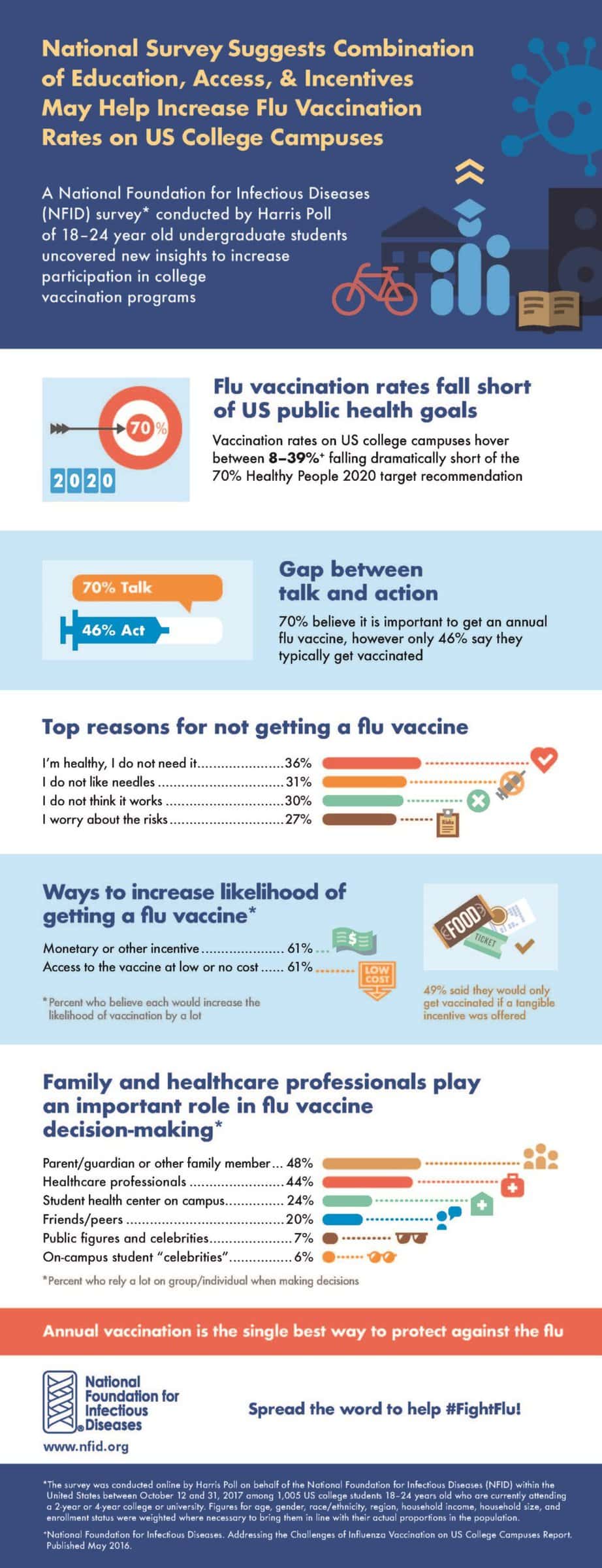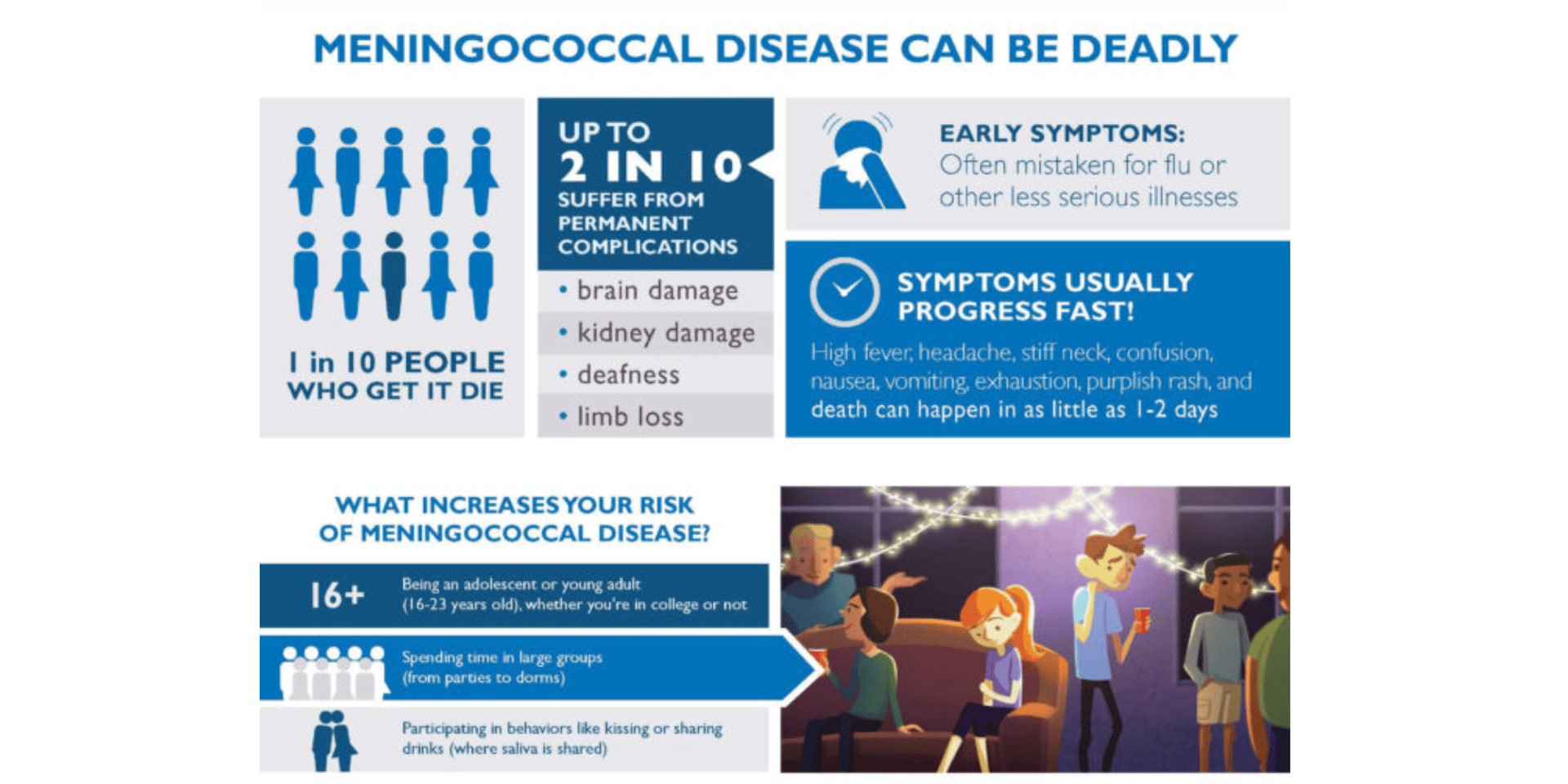
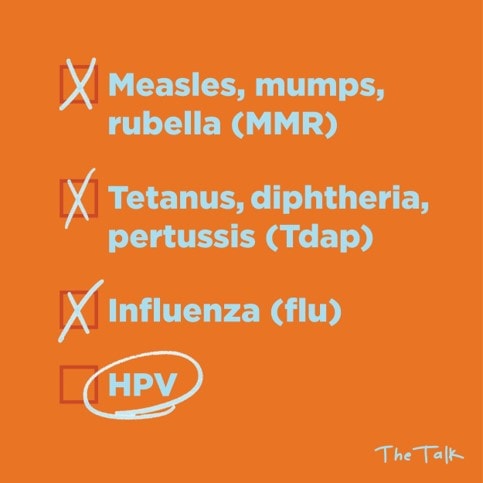 Is your teen prepared with the essentials for college life? You may have helped furnish a new dorm room, or at least done some shopping together, but it is equally important that you help them lead a healthy lifestyle, which includes making sure they are protected from vaccine-preventable diseases frequently seen on college campuses!
Is your teen prepared with the essentials for college life? You may have helped furnish a new dorm room, or at least done some shopping together, but it is equally important that you help them lead a healthy lifestyle, which includes making sure they are protected from vaccine-preventable diseases frequently seen on college campuses!
As some diseases can spread quickly in settings like college dorms and classrooms, many colleges and universities have vaccination requirements for school entry. Even if they are not required for college entry, the following vaccines are important to help protect college students:
Influenza (flu): Flu is a contagious viral infection of the nose, throat, and lungs, that can cause severe illness and is easily spread from person to person. Flu and related complications are responsible for 3,000-49,000 US deaths each year, depending on the severity of the circulating viruses. Flu vaccination is recommended annually for everyone age 6 months and older and should be given as soon as the vaccine is available.
Although most college students in the US (70%) believe it is important to get an annual flu vaccine, less than half (46%) say they typically get vaccinated, according to results from an NFID online survey of US college students 18-24 years old conducted by Harris Poll in October 2017. Students who live on campus are at greater risk of contracting flu which can significantly impact student life with missed classes and social events, and can lead to severe complications, including death. Read Why Aren’t College Students Getting Flu Shots? to learn about common barriers to flu vaccination on college campuses
Human papillomavirus (HPV): HPV is a group of more than 150 viruses transmitted through intimate skin-to-skin contact that infects about 14 million people in the US every year. HPV is the main cause of cervical cancer and can also cause genital warts as well as cancer of the vulva, vagina, penis, anus, mouth, and throat. Even without symptoms, infected individuals can still spread the virus to others. Most new infections occur in teens and young adults in their early twenties so it is important to ensure that your child is protected through vaccination prior to exposure to HPV. The HPV vaccine series is recommended for both females and males beginning at age 11-12 years and for those not previously vaccinated, up to age 26 for females and age 21 for males.
NFID is collaborating with DoSomething.org, a social advocacy group with a digital platform reaching more than 6 million adolescents, to encourage students to have “The Talk” with a parent or guardian about HPV and the importance of vaccination. Participants are prompted to make a card telling their parent/guardian they want to stay HPV-free to spark the conversation about HPV vaccination.
Tetanus, diphtheria, and pertussis (Tdap): These three diseases are all caused by bacteria. Diphtheria and pertussis are spread from person to person. Tetanus bacteria live in soil and dirt; the bacteria enter the body through cuts, scratches, or wounds. Tdap vaccine protects against all three. All adolescents 11-18 years of age should get a Tdap booster once, followed by the Td booster every 10 years. Adolescents who have already received a booster dose of Td are encouraged to get a single dose of Tdap as well, for protection against pertussis (whooping cough).
Meningococcal disease: Meningococcal disease is a serious bacterial infection that most often leads to severe swelling of the tissues surrounding the brain and spinal cord (meningitis) or infection of the bloodstream (sepsis). Early symptoms are often mistaken for flu or other less serious illnesses. Symptoms can progress quickly and may include high fever, headache, stiff neck, confusion, nausea, vomiting, exhaustion, and a purplish rash. Even with treatment, approximately one out of every 10 people who get meningococcal disease will die and of those who survive, up to 20 percent will suffer serious and permanent complications including brain damage, kidney damage, hearing loss, and amputation of arms, legs, fingers, or toes. The infection is spread by close, direct contact with people who carry the bacteria in their nose or throat and is characterized by rapid onset. Most cases occur in previously healthy people. There are two types of vaccines to help prevent meningococcal disease:
- Routine vaccination with a quadrivalent vaccine that protects against four major meningococcal serogroups (A, C, W, and Y) is recommended for all adolescents at age 11-12 years with a booster dose at age 16 years.
- Meningococcal serogroup B (MenB) vaccination is recommended for adolescents with certain high risk conditions, including college students on campuses experiencing outbreaks caused by the serogroup B bacteria. MenB vaccines may also be given at clinical discretion to adolescents age 16–23 years (preferred age 16–18 years) who are not at increased risk.
View the free NFID toolkit to learn more about the importance of meningococcal disease prevention.
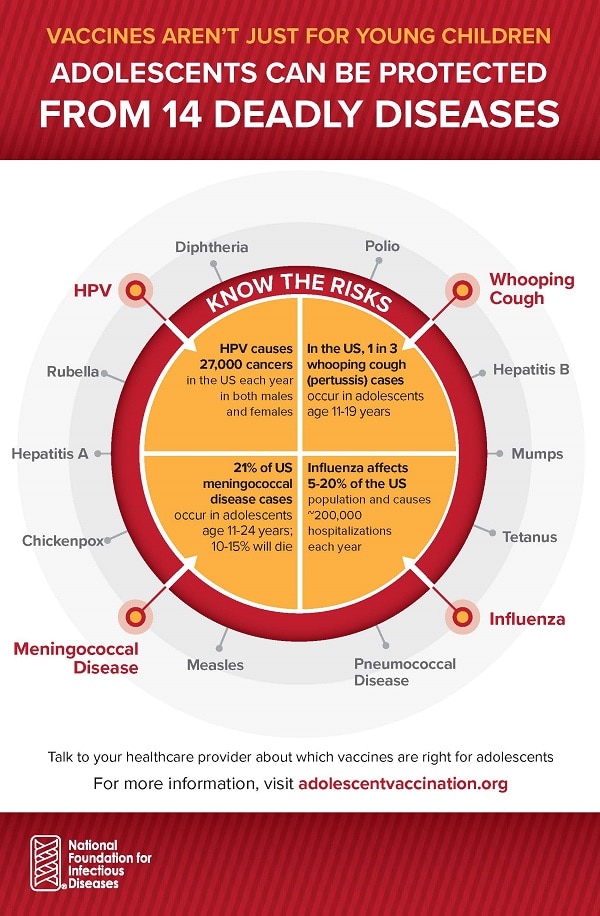 To learn more about all recommended adolescent vaccines, visit www.adolescentvaccination.org. Looking for nearby locations that offer recommended vaccines? Visit HealthMap Vaccine Finder, a free, online service to help parents and college students search for vaccine providers by zip code.
To learn more about all recommended adolescent vaccines, visit www.adolescentvaccination.org. Looking for nearby locations that offer recommended vaccines? Visit HealthMap Vaccine Finder, a free, online service to help parents and college students search for vaccine providers by zip code.
To join the conversation, follow NFID on Twitter, like us on Facebook, follow us on Instagram, join the NFID Linkedin Group, and subscribe to NFID Updates.
Related Posts

ID News of Interest: Bird Flu, Measles, and Meningococcal Disease
CDC issued health alerts on bird flu, measles, and meningococcal disease. Read the latest news including insights and explanations from infectious disease experts …
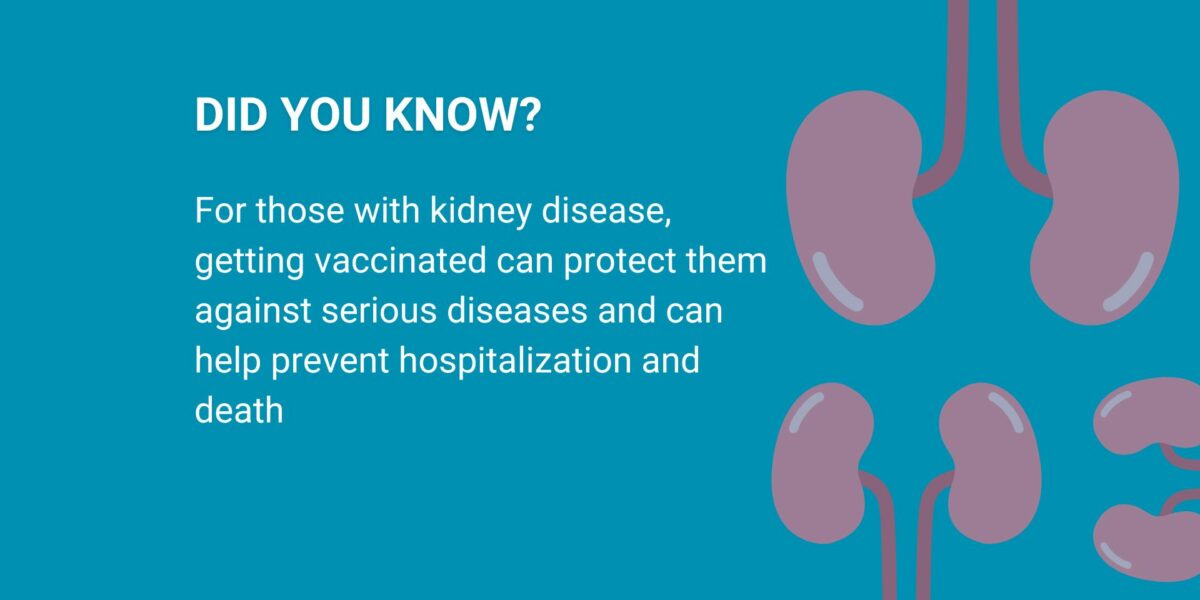
3 Things You Need to Know about Kidney Disease and Vaccines
It is important for people with kidney disease to understand how critical vaccination can be for their health and well-being

5 Reasons Why Vaccines Are Good for Your Heart
For people with heart disease, getting vaccinated is as important to staying healthy as diet and exercise

